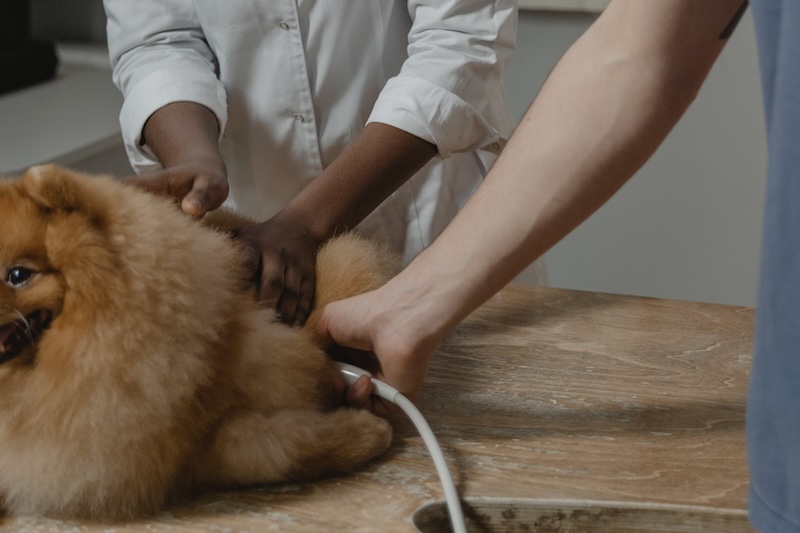This article was approved by Lemonade’s favorite vet, Dr. Stephanie Liff.
If you see your energetic and active furry friend limping in pain and having difficulty standing up, you’d probably do anything to help them find their footing. But treating orthopedic issues in dogs can come with some hefty costs, so it’s important to be ready for what’s ahead—like covering your pooch with pet insurance.
Let’s break down orthopedic conditions in dogs, and take a look at how pet insurance can help take a bite out of related vet bills.
What’s an orthopedic condition?

An orthopedic condition refers to any ailment or disorder affecting the bones, skeletal muscle, cartilage, joints, ligaments, or tendons in a dog’s body.
These conditions generally lead to symptoms that could significantly impact your dog’s quality of life, like:
- Limping or favoring a leg
- Reduced mobility
- Joint swelling
- Vocalizing pain
- Sensitivity to touch
- Stiffness, especially after rest or being cold
- Aggression when you attempt to touch the affected area
Treatment for these types of conditions will vary depending on each dog’s specific needs and the severity of their condition, but often includes a combination of medical management, physical therapy, and sometimes, orthopedic surgery.
Keep in mind that even if your pooch shows any of the signs listed above, it doesn’t necessarily mean it’s related to an orthopedic condition. Consult with your vet to get your furry friend a proper diagnosis and treatment plan.
What are the most common orthopedic problems in dogs?
Here are some common orthopedic conditions in dogs:
- Hip dysplasia: Abnormal hip joint formation, which can lead to arthritis
- Elbow dysplasia: Abnormal joint formation causing elbow pain and limping
- Cranial cruciate ligament (CCL) tear: Also known as the dog equivalent of a human ACL tear, this is a knee ligament rupture causing pain and lameness
- Osteoarthritis: Inflammation of the joints, leading to pain, stiffness, and reduced mobility
- Intervertebral disc disease: Spinal disc herniation causing pain and possibly paralysis
- Luxating patella: Dislocated kneecap causing intermittent limping or lameness
- Osteochondrosis: Abnormal cartilage development affecting joint function and health
- Panosteitis: Inflammatory bone condition causing intermittent lameness and pain
- Hypertrophic osteodystrophy: Bone disease in young dogs causing pain and swelling
Which dog breeds are most prone to orthopedic conditions?
The following breeds may be at an increased risk of developing orthopedic conditions due to their conformation and lifestyle:
- Labrador Retriever: Hip and elbow dysplasia and cruciate ligament injury
- German Shepherd: Hip dysplasia and elbow dysplasia
- Golden Retriever: Hip dysplasia, elbow dysplasia, and osteoarthritis
- Rottweiler: Hip dysplasia, elbow dysplasia, and osteochondrosis
- Great Dane: Hip dysplasia, elbow dysplasia, and osteoarthritis
- Boxer: Hip dysplasia and osteoarthritis
- Dachshund: Intervertebral disc disease (IVDD), due to long spine
- Bulldog: Hip dysplasia and various joint problems
- Mastiff: Hip and elbow dysplasia, and cruciate ligament injury
- Basset Hound: Intervertebral disc disease and elbow dysplasia
While certain breeds may be more predisposed to orthopedic problems than others, any dog can develop these conditions depending on factors like their overall health, weight, and activity levels. Taking preventative measures and ensuring early detection through regular vet check-ups can significantly help manage these conditions effectively, and improve your dog’s overall health and wellness.
Can cats have orthopedic issues too?
Absolutely. Cats can also suffer from orthopedic conditions. (Though they often hide their pain more effectively than dogs, making the signs and symptoms less obvious to pet parents.)
Cats aren’t necessarily as prone to all of the same conditions as dogs. For example, cats very rarely tear ligaments. Here are some common orthopedic conditions in cats:
- Osteoarthritis
- Osteochondrodysplasia, or Scottish Fold disease (SFOCD), which is a genetic mutation found in the Scottish Fold breed of cat
- Disorders of the hip
- Luxating patella
Looking for signs of pain from your stealthy cat? Check if they have difficulty jumping up or down, climbing up or down stairs, chasing moving objects, or running. If they tick any of these boxes, it’s probably time to get them checked for an orthopedic issue.
Keep in mind: There are fewer cat-safe options for pain management compared to dogs, so if your kitty suffers from an orthopedic condition, it’s crucial to follow your vet’s treatment plan.
Does pet insurance cover orthopedic conditions?

A Lemonade pet insurance policy can help to cover the costs of your dog’s medical bills related to orthopedic conditions (keeping in mind your deductible and co-insurance), giving you the peace of mind of knowing you’ll be able to afford the care your dog needs.
For example, if your Mastiff “Luna” starts limping and crying when she stands up, pet insurance could help to pay for diagnostic tests, like x-rays, and even for a pricey orthopedic procedure (like TPLO surgery, which can range from $6,000 to $10,000 per knee) if her condition requires surgical intervention.
But there are some limitations to keep in mind.
Your pet won’t be covered for medical expenses that occur before your policy’s waiting period ends. For example, if you buy a Lemonade Pet policy and Luna sustains a cruciate ligament injury during your waiting period, that condition would be considered a pre-existing condition, and would be excluded from your coverage.
That’s why it’s so important to cover your pet as early in their life as possible, before they develop pre-existing conditions. At Lemonade you can buy a policy for your puppy or kitten from just eight weeks old.
If Luna develops a CCL issue after your policy’s waiting period ends, your policy can help to cover costs including diagnostics, procedures (including surgeries), and medications related to the condition.
If you want your policy to cover eligible exam fees and follow-ups, you will need to add the vet visit add-on. If you want even more coverage, and want help paying for vet-recommended physical therapy, you can include the physical therapy add-on on your policy.
With innovation and new medications and treatments comes an incredible opportunity to manage your pet’s orthopedic diseases more effectively. But these options can also get pretty expensive. Insurance is invaluable to allowing us to offer the best management for your pets orthopedic disease
Dr. Stephanie Liff
Click below to start your free quote.
A few quick words, because we <3 our lawyers: This post is general in nature, and any statement in it doesn’t alter the terms, conditions, exclusions, or limitations of policies issued by Lemonade, which differ according to your state of residence. You’re encouraged to discuss your specific circumstances with your own professional advisors. The purpose of this post is merely to provide you with info and insights you can use to make such discussions more productive! Naturally, all comments by, or references to, third parties represent their own views, and Lemonade assumes no responsibility for them. Coverage and discounts may not be available in all states.




